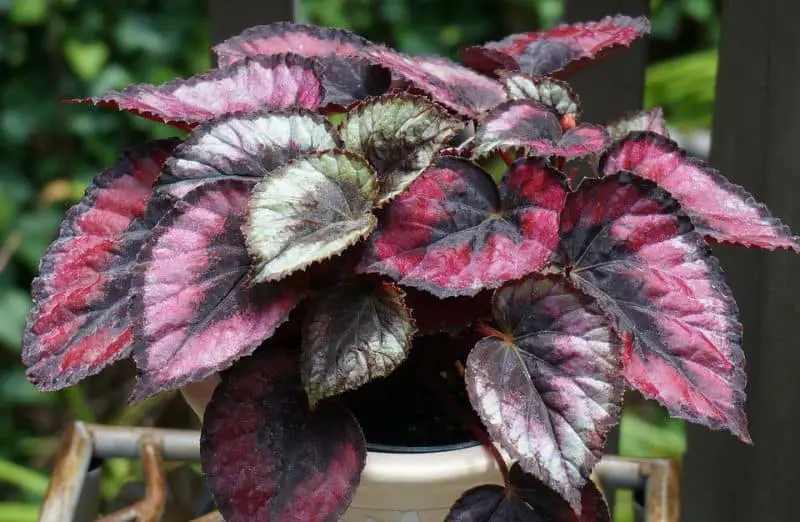This post contains affiliate links. If you buy something from one of our links we may earn a commission. Thanks

If you are looking for a beautiful and low-maintenance indoor plant, Rex begonias may be perfect for you!
Rex Begonia Key Takeaways:
- Rex Begonia indoor care needs a balance of moderate to bright indirect light.
- Provide a temperature range of 60 to 70 degrees Fahrenheit and about 50% humidity.
- Watering should be done thoroughly, allowing the soil to dry out before the next watering.
- Fertilize lightly every other month and be vigilant for mealybugs, a common pest for Rex Begonias.
In this blog post, we will talk about Rex begonia care indoors so you can keep your rex begonia healthy and happy!
These plants thrive in moderate to bright light and can tolerate cooler temperatures.
Rex begonias come in a variety of colors, so you can find the perfect one to fit your home’s decor.
What Is Rex Begonia?
Begonia rex, the king begonia, is a species of flowering plant in the family Begoniaceae. It is found from Arunachal Pradesh to southeast China, and has been introduced to Bangladesh, Cuba, and Hispaniola. It is a parent to over 500 cultivars in the Begonia Rex Cultorum (Group of houseplants). https://en.wikipedia.org/wiki/Begonia_rex
Rex begonia is one of the most interesting indoor plants around, and despite its exotic looks they are actually very easy to grow.
It’s the perfect size for desks and tabletops because it stays fairly short and has wildly colorful variegated foliage which makes a great contrast against other houseplants!
How To Care For Rex Begonias Indoors In A Nutshell
How To Care For Rex Begonias Indoors a quick summary:
- Rex begonias need moderate to bright indirect light.
- Rex begonias like to be kept moist, but not soggy.
- Rex begonias do well at 60 to 70 degrees Fahrenheit
- They also like about 50% humidity level.
- Rex begonias are not heavy feeders, so fertilize them every other month or so.
- Rex begonias are susceptible to mealybugs, so keep an eye out for these pests.
Rex Begonia Care Indoors
So you have a Rex begonia and you want to know how to take care of it. Fortunately, these beautiful plants are easy to grow and easy to propagate.
Below you will find more detailed information on how to care for your Rex begonia.
Rex Begonia Light Requirements
One of the most important things to consider when growing Rex Begonias is their light requirements.
These plants prefer bright, indirect light and will not do well if they are placed in an area that receives direct sunlight.
Signs of too much sunlight can be bleaching leaves and fading from green to yellow. Leaves may also look scorched.
If you see this move your plant to a lower light area.
Rex Begonia Temperature And Humidity
Most Rex Begonia varieties prefer warm temperatures and high humidity. A humidity level of 50% will keep them happy.
If the air in your home is dry, you may need to mist your Rex Begonia regularly or set it on a pebble tray to keep the leaves from drying out.
If leaf edges are curling or turning brown your plant is not getting enough humidity.
When it comes to temperature, Rex Begonias will do best if kept between 65 and 75 degrees Fahrenheit.
Begonia Rex Watering
Watering your Begonia Rex is important, but it’s also equally as important not to overwater it.
The best way to water this type of Begonia is to give it a good soaking, then allow the soil to dry out completely before watering again.
This will help to prevent root rot, which can be a problem with begonias.
When you do water, make sure to use lukewarm water and avoid getting the leaves wet.
Watering in the morning is best, as this will give the plant time to dry out before nighttime.
Pot Size Affects Watering
Keep in mind a rex begonia that is planted in a pot that is too small will not have room to develop an extensive root system and will be more prone to drought stress and need more frequent watering.
On the other hand, they like to be snug in their pots and shouldn’t be over-potted either as the soil may take too long to dry out.
Begonia Rex Soil Mix
Rex begonias do best in a soil mix that is high in organic matter and drains well.
Coco makes an excellent growing medium for rex begonias because it holds moisture well but is also fast draining.
You can also choose a peat-based potting mix with added perlite for your begonias. Don’t use cactus or succulent mixes though.
As you will see later in this article rex begonias can also be grown in water culture with no soil whatsoever.
Pruning Rex Begonia
Rex begonias are a great plant for beginners because they only require minimal pruning.
Removing any dying or discolored leaves is usually all that is needed. But you can trim back any long or unruly stems to help shape the plant.
If you want to create fuller plants, cut back stems to a node with clean snips and watch as new leaves grow in from the base.
You can also pinch young tips so that the plant gets bushier.
Rex Begonia Propagation
Rex begonias are very easy to propagate, They can be propagated by leaf cuttings but they can also be propagated and even grown in water culture.
Propagating Rex Begonia From Leaf Cuttings
Here is a video showing you how to propagate Rex begonias from leaf cuttings.
Propagating Rex Begonia In Water
Rex begonias also can be propagated and grown in water culture. One advantage of this is avoiding soil and pests like fungus gnats that can come with using soil.
Is Rex Begonia Poisonous?
According to the ASPCA Rex begonia is toxic to cats, dogs, and humans with the roots being the most toxic.
Scientific Name: Begonia rex
Family: BegoniaceaeToxicity: Toxic to Dogs, Toxic to Cats, Toxic to HorsesToxic Principles: Soluble calcium oxalates
Clinical Signs: Kidney failure (in grazing animals), vomiting, salivation in dogs/cats. Most toxic part is underground. https://www.aspca.org/pet-care/animal-poison-control/toxic-and-non-toxic-plants/rex-begonia
Some people say the leaves are not toxic but personally, I would not take the chance of kids or pets getting poisoned. I would keep this plant in a place where children and pets can not access it.
Rex Begonia FAQs
Rex Begonias, with their vibrant foliage, are a delightful addition to any indoor garden, effortlessly bringing a splash of color to your space.
Although they are fairly easy to care for, certain questions might pop up as you embark on the journey of nurturing these beautiful plants.
Through the following frequently asked questions, we aim to address common queries and provide insightful answers to ensure your Rex Begonias remain healthy and continue to brighten up your indoor space.
Q. How much sunlight do Rex Begonias require?
A. Rex Begonias thrive in moderate to bright indirect light. Too much direct sunlight can cause leaf bleaching and scorching.
If leaves turn yellow or brown, it’s a sign that the plant needs to be moved to a lower-light area.
Q. What is the ideal watering routine for Rex Begonias?
A. Water Rex Begonias thoroughly, allowing the soil to dry out completely before the next watering.
It’s crucial to avoid waterlogging as it can lead to root rot. Morning is the ideal time for watering to allow the plant to dry before night.
Q. How often should I repot Rex Begonias?
A. The pot size affects the watering frequency and overall health of your Rex Begonia.
While they like to be snug in their pots, repotting every year to a pot an inch or two larger can be beneficial, especially if the plant has outgrown its current pot.
Q. Are Rex Begonias toxic to pets and humans?
A. Yes, Rex Begonias are toxic to cats, dogs, and humans, with the roots being the most toxic part.
It’s advisable to place Rex Begonias where children and pets can’t reach them to avoid any accidental ingestion or contact.
Rex Begonia Care Indoors Final Thoughts
Rex begonias are beautiful and easy to care for houseplants. They make great additions to any indoor space and with proper care, they can last for many years.
Follow the tips in this article and you will be well on your way to having a healthy and happy Rex begonia plant. Thanks for reading!






